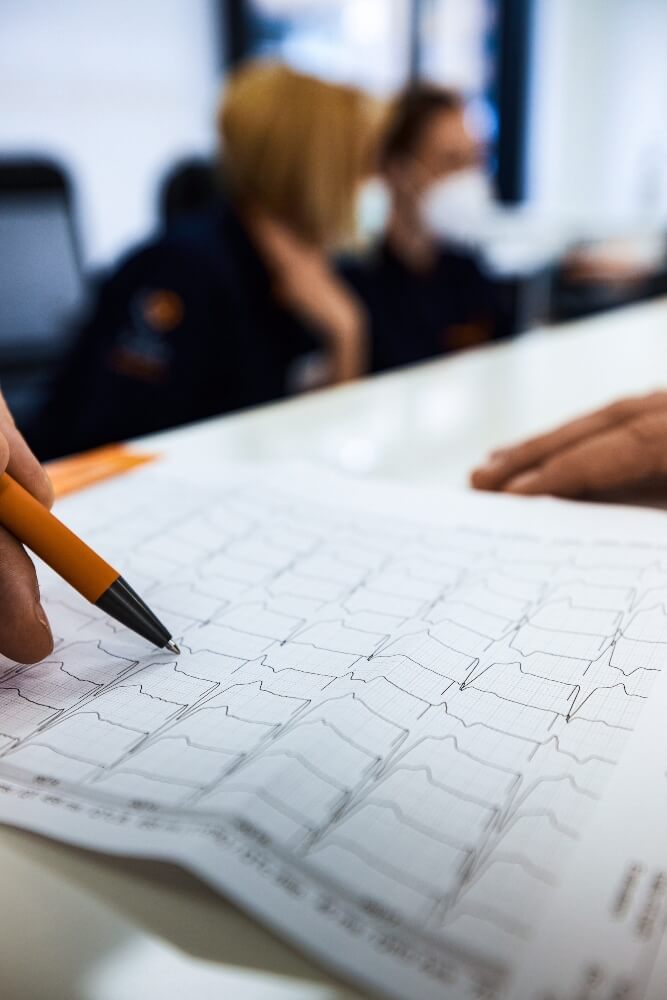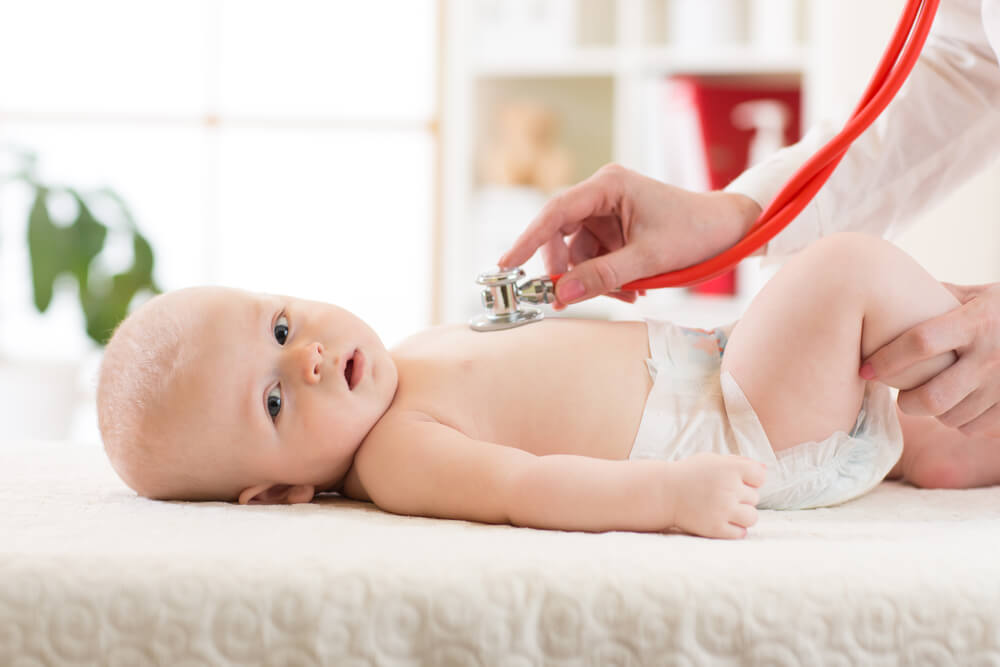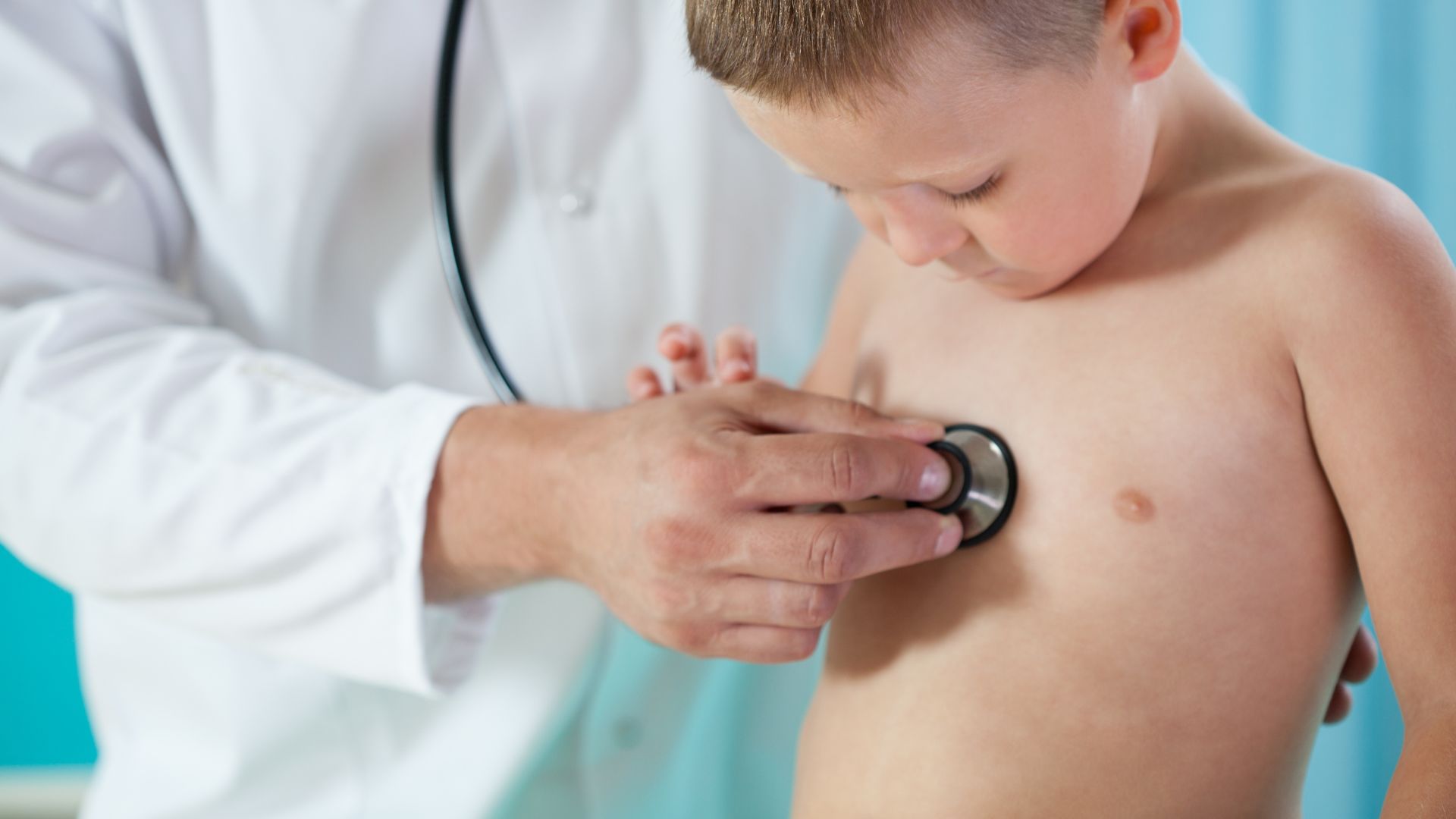About 0.8% of children are born with heart defects, and an even smaller percentage of them have problems that are difficult to solve. Therefore, follow the doctor’s instructions and take your child to all the necessary examinations, because a good diagnosis will be crucial for further treatment, if it is necessary.
What is a heart murmur?
 A heart murmur represents a changed sound, that is, a more turbulent passage of blood through the heart. It is easy to spot with a simple examination with a stethoscope. It is very often observed in children of different ages and in the majority of situations it is harmless and transient. Such a heart murmur in children that does not require treatment is called physiological. It should disappear completely by puberty, otherwise it occurs when there is an infection in the body and its intensity varies, it increases then, and weakens when the infection passes.
A heart murmur represents a changed sound, that is, a more turbulent passage of blood through the heart. It is easy to spot with a simple examination with a stethoscope. It is very often observed in children of different ages and in the majority of situations it is harmless and transient. Such a heart murmur in children that does not require treatment is called physiological. It should disappear completely by puberty, otherwise it occurs when there is an infection in the body and its intensity varies, it increases then, and weakens when the infection passes.
Unlike a physiological murmur, an organic murmur does not weaken, but its intensity is maintained or increases, and it requires further analysis and the pediatric cardiologist must be informed.
A heart murmur can be the first sign that something is wrong with the heart.
Does a heart murmur in children mean that the heart is sick?
As mentioned before, not every noise is a sign of alarm and not every noise means that there is a problem and that the heart is sick. The child should be taken to a pediatric cardiologist if the pediatrician deems it necessary.
Unfortunately, a certain number of children will fall into the second group, where a heart murmur is really a sign that something is wrong, and then you should not wait, you should react immediately.
At Pulse Cardiology Center, the top expert children’s cardiologist, professor Prof. dr Jovan Košutić, is waiting for you, so if there are any doubts and fears regarding the work of your child’s heart muscle, do not hesitate to schedule an examination, because such problems require a quick response and treatment
Symptoms of heart disease in children
Heart diseases in children are most often congenital and are detected quickly. In some, more severe cases, already after birth, and in others in a period of 2 to 8 weeks. There are some things that you should pay attention to in the first weeks of a newborn baby’s life, because they can be warning signs and you must mention them to the pediatrician.
Symptoms of heart problems in babies are:
- hard breathing
- rapid breathing
- bluish skin color
- fatigue when feeding
- chest pain
- loss of consciousness
- lag in advancement
Why do heart diseases occur in babies?
Most often, heart problems in newborn babies are related to genetics, that is, a child may have genetic predispositions for their development, but the problem does not necessarily have to be inherited directly from the parents. The reason can also be an error in the genetic code.
Viral and bacterial infections present in the mother during pregnancy are also classified as reasons for the occurrence of heart defects, but the use of certain drugs, exposure to harmful substances or X-ray radiation during pregnancy also increase the risk.
Pregnant women with diabetes must take special care to control this disease before and during pregnancy, because it can also affect the baby’s heart.
Diagnosing heart murmurs and heart disease
Some problems can also be observed during pregnancy, although certain ultrasound examinations are mandatory, including an expert ultrasound in the period from the 20th to the 26th week when fetal echocardiography is performed, during which the baby’s heart is examined in great detail.
However, not every change will be noticed then, because this ultrasound, like all diagnostic methods, has its limitations and you will be informed about this by your gynecologist.

After birth, it will soon be clear if there is a problem. A heart murmur, especially if it is organic, i.e. one that requires observation and treatment, will be noticed early, and it can be identified by examining it with a stethoscope.
When a pediatrician first hears a heart murmur in your child who is already several years old, it is more likely that it is harmless and occurs only when the body is in certain stages or infections. Such murmurs will mostly disappear by puberty because the body develops and grows, as well as the muscles, so by the end of puberty the heart will be further from the stethoscope and soft murmurs will no longer be audible.
Diagnosing heart disease must be performed by an expert based on certain steps and analyses. At the first screening you can expect:
- clinical examination (cardiologist listens for murmurs)
- EKG (a painless and harmless method used to monitor and measure the heart’s electrical impulses)
After this basic cardiological examination, it is possible to determine whether there is a need for further tests or whether the murmur is harmless. If it is necessary to carry out further analyses, the first will probably be an echo of the heart, that is, an ultrasound of the heart, which will help the cardiologist to see the shape, structure of the heart, dimensions, its capabilities, the performance of the atria and ventricles, how it pumps blood, whether there is a murmur, whether there is fluid around the heart.
It happens less often, but there is a possibility that children will be diagnosed with a murmur or some other heart problem only later, in elementary school age. Chest pain in children is a signal that we must never ignore.
It is important that the parents then take the situation seriously and take the child to a specialist examination, after which they will make sure that the child receives therapy and follows the instructions. The fact that the child trained normally, lived without major problems with a heart defect, does not mean that it will always be like this without therapy. Some murmurs are very silent, yet dangerous, and some heart conditions are simply not that easy to spot, and are dangerous and should be taken seriously, regardless of when they are diagnosed.
Treatment of heart disease
Some murmurs and heart defects do not require treatment, but if there is a need for treatment, then it is possible to go in two directions – the use of drugs or surgical intervention, and sometimes these two methods are combined.
In a large number of children, it is possible to treat or cure the disease, so their life can take place completely normally, without sacrifice, but in a small number it will require an adjustment of the way of life and a long struggle.
Heart diseases in children and physical activity
Can my child practice a sport if he has a heart murmur or other heart defect?
This question bothers parents the most, because they are aware of the importance of these activities for the development of motor skills, but also for the health of their children.
It is impossible to answer only yes or no, because everything depends on the child, the age, the type of problem.
The cardiologist will give you the best answer and you must not decide on the subject without consulting him.
Pulse Cardiology Center – Pediatric cardiology
We are used to associating heart problems with the elderly, but this is not the case in reality, and these diseases can occur in newborns as well, but also later in development.
It is important that you know that not every noise and chest pain in children will be a sign of illness and that in fact in most cases in children it is physiological, transitory and harmless. If your pediatrician refers you to further tests, even then there is a chance that the results will be positive, and if a problem is detected, know that modern medicine offers many treatment options and you should choose experts you trust.
The most important thing is not to postpone examinations and analyses, because every moment is important for the heart. Make an appointment with a pediatric cardiologist at Pulse Cardiology Center.





